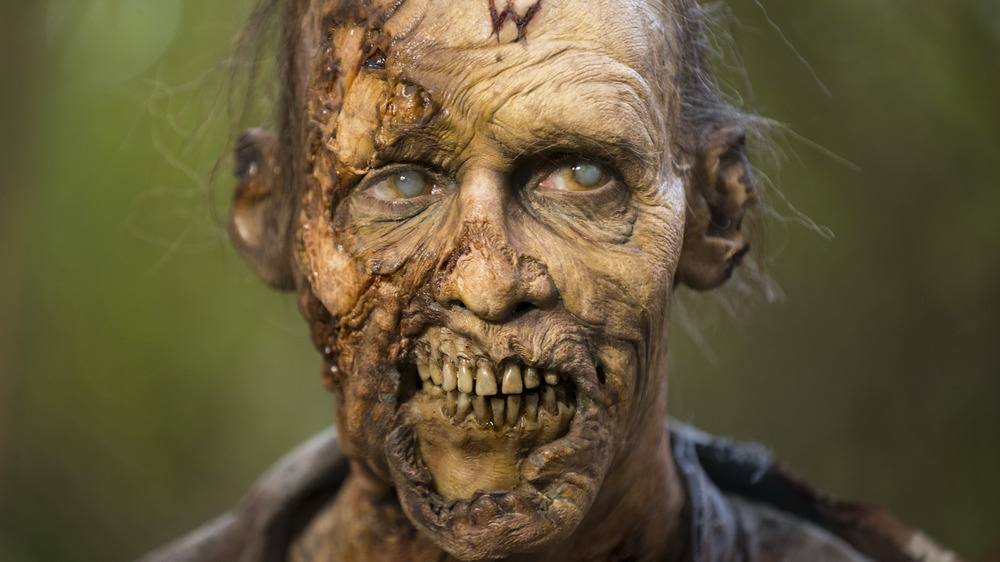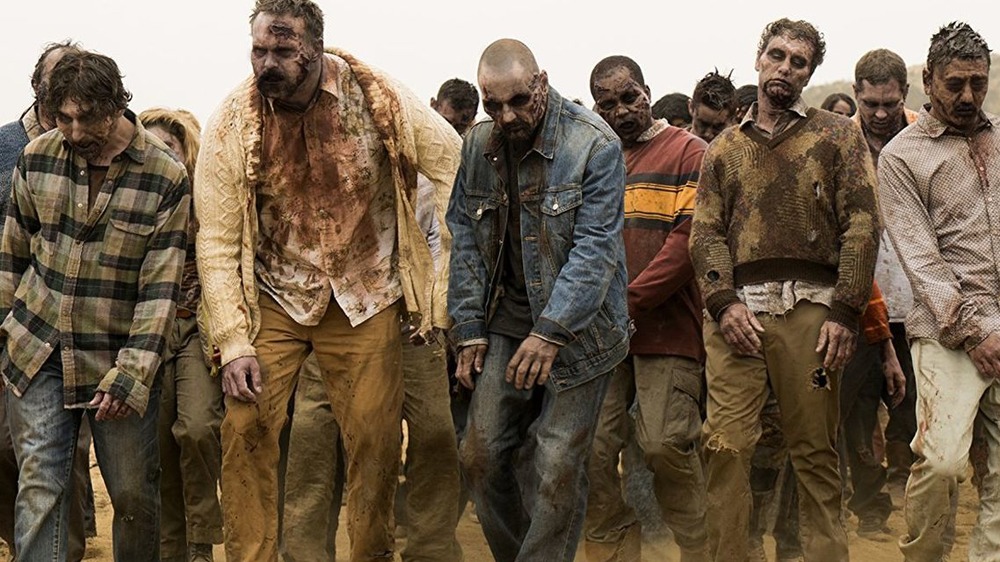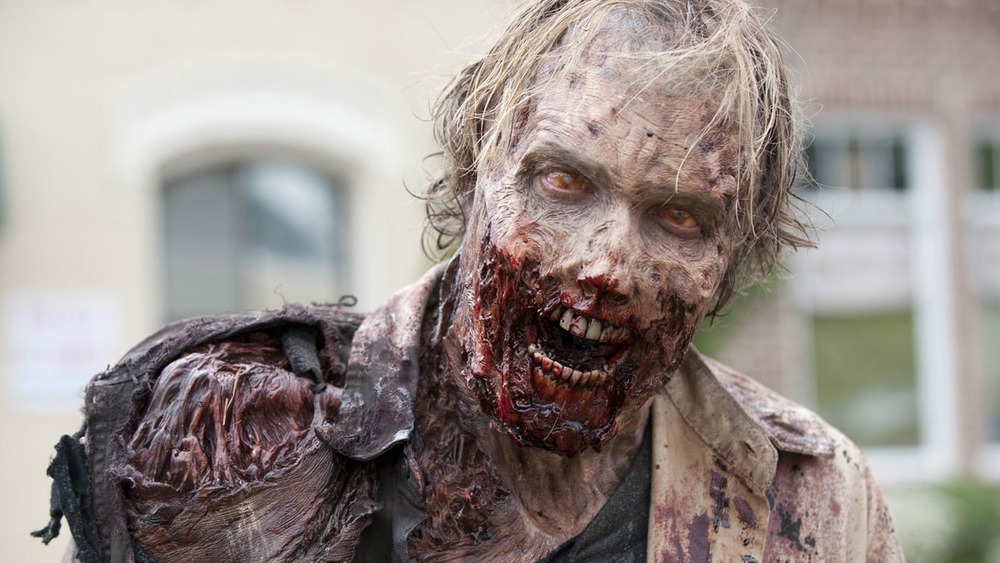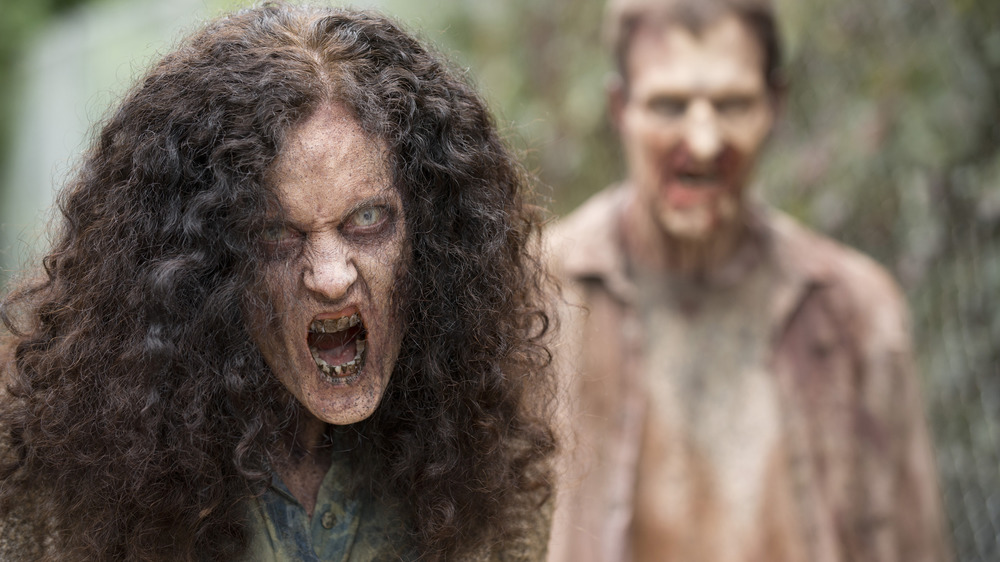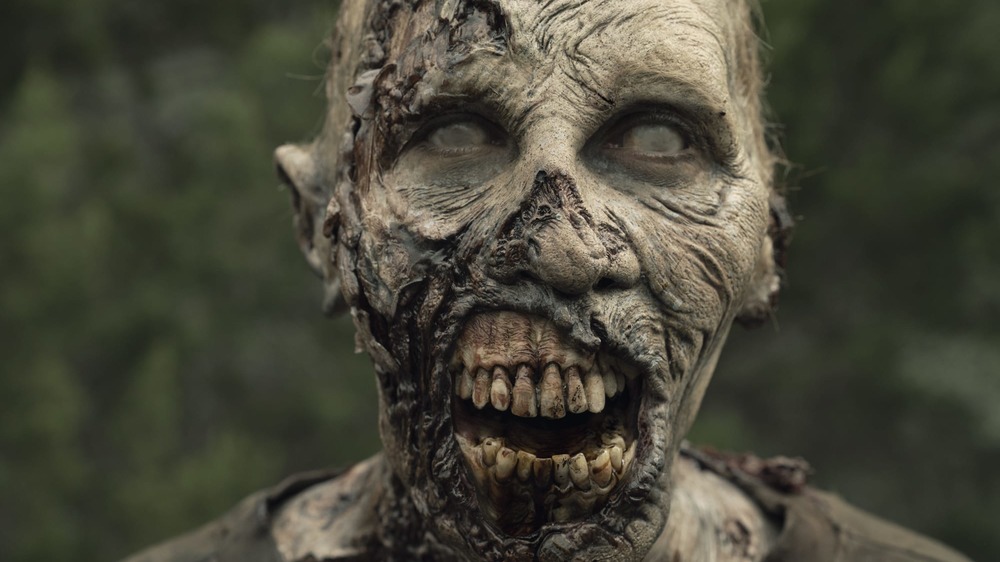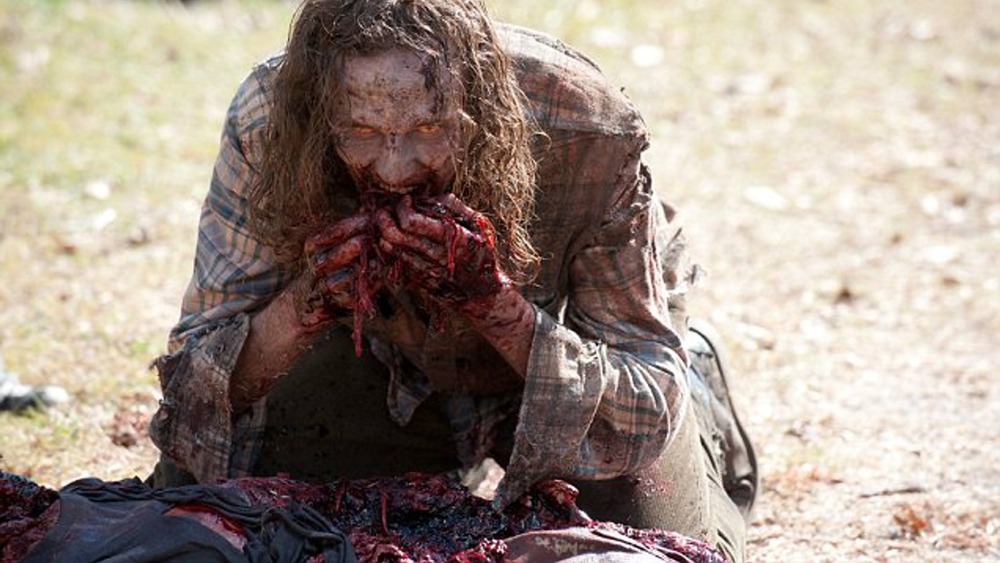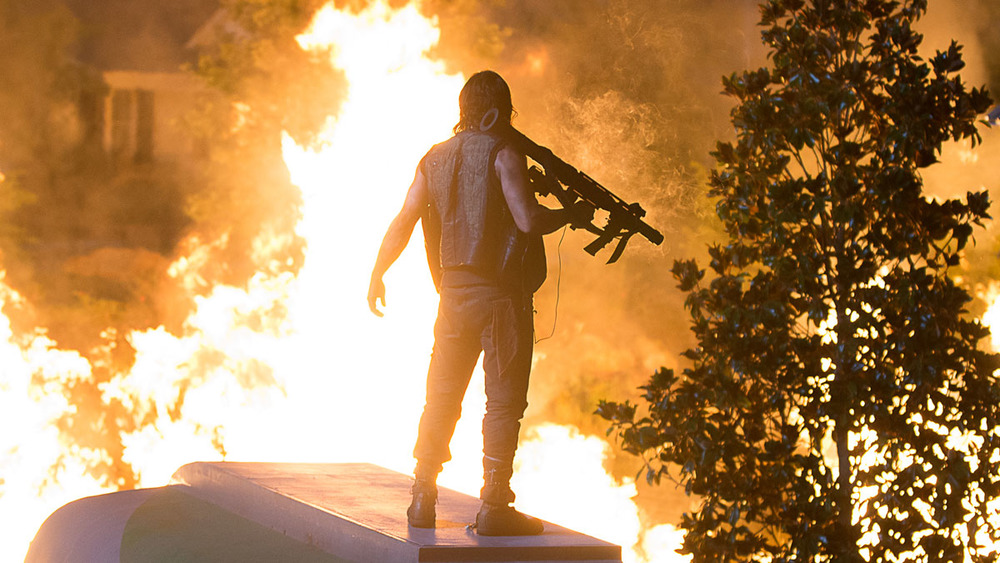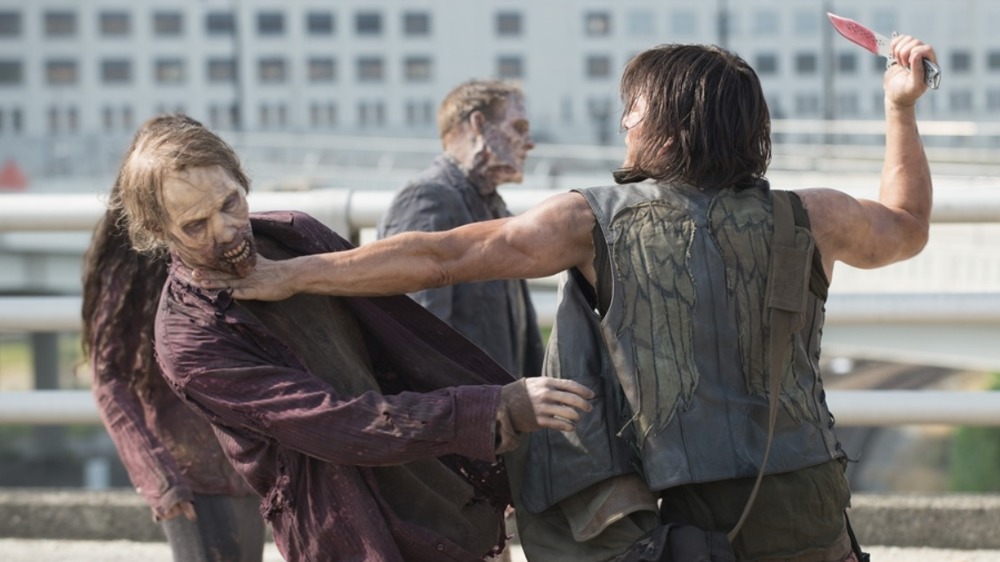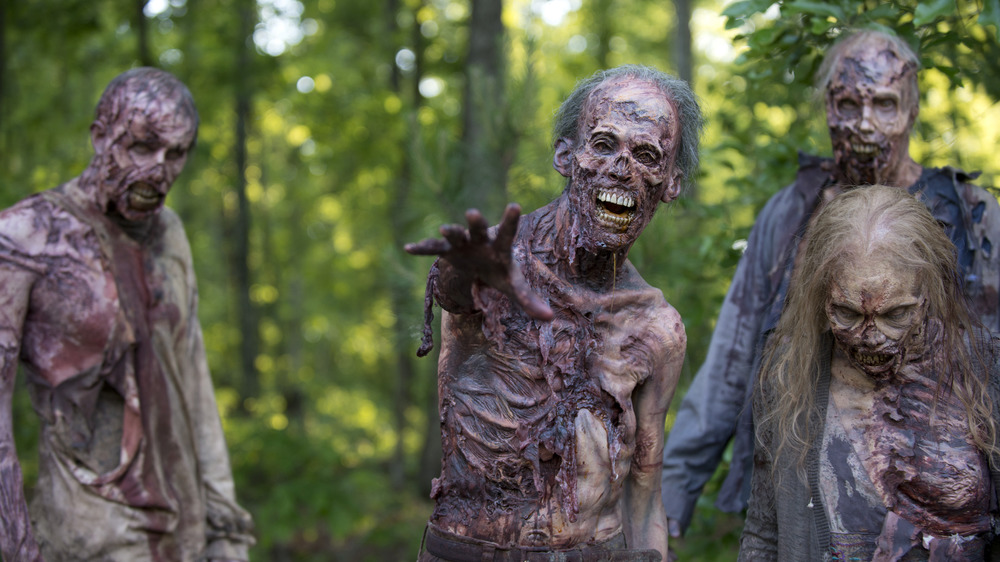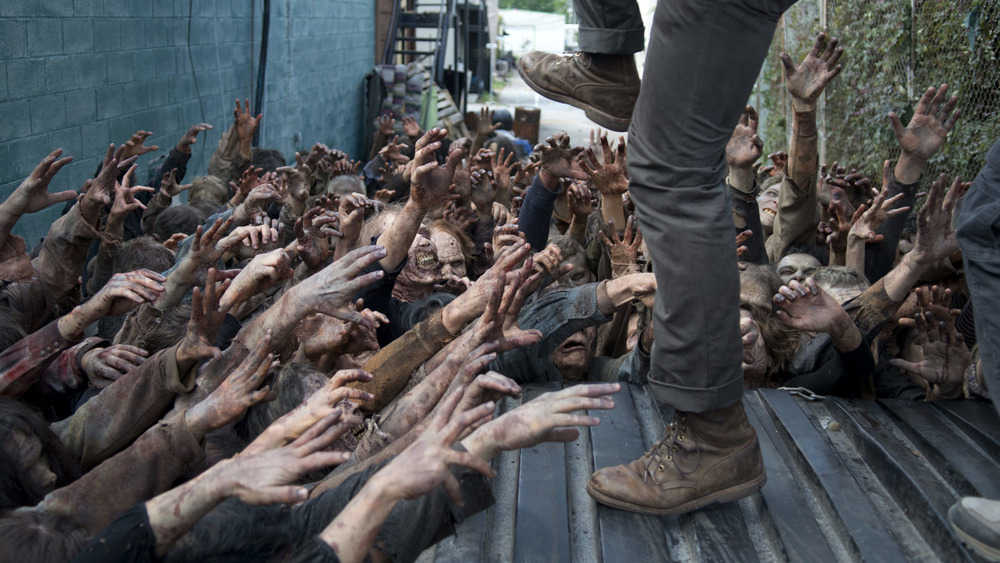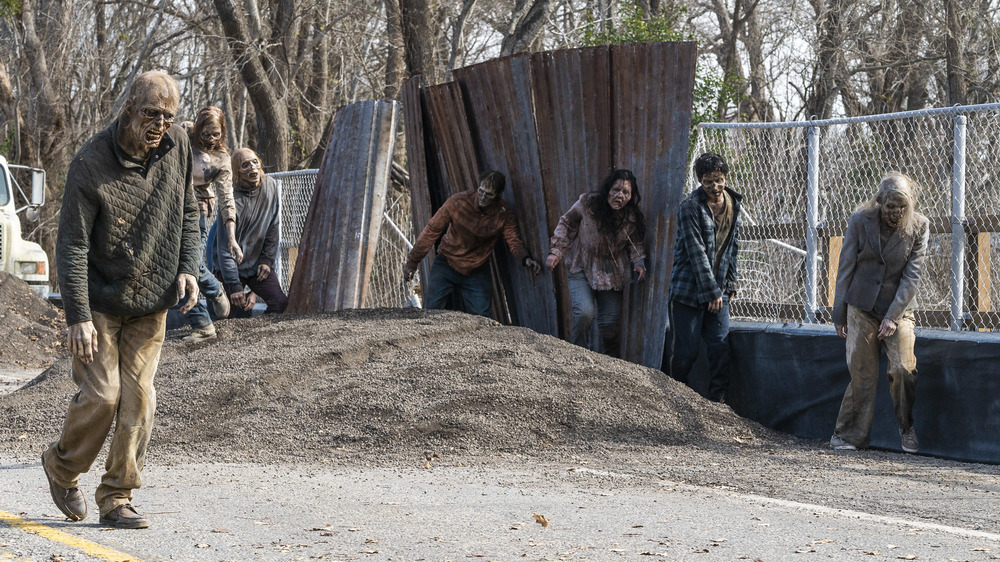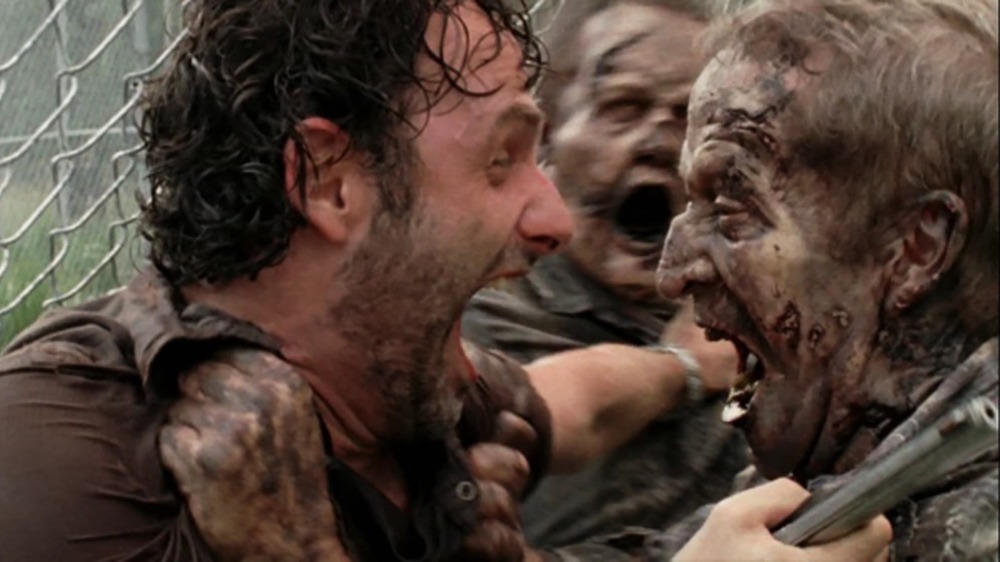Rules Walkers Have To Follow In The Walking Dead
At some point in your life, you've probably wondered to yourself, "Why don't the characters on AMC's long-running horror-action series The Walking Dead, or any of its spin-off shows, ever call the zombies 'zombies?' They always call 'em 'walkers' or 'biters' or 'roamers' or something like that. Are there differences between zombies and walkers? What's happening here?"
At that point, you might have gone searching for the answer and come across the following quote from Walking Dead comic co-creator Robert Kirkman. "Zombie lore is very popular," Kirkman told Conan O'Brien in a 2016 interview. "We wanted to avoid that notion of, 'Hey, why doesn't that character just shoot that zombie in the head because [they] saw all those movies I saw?' We wanted to kind of give you a sense that The Walking Dead takes place in a universe where zombie fiction doesn't exist. No one in The Walking Dead has seen a [George] Romero movie, so they can't get the rules from that."
He's specifically talking about the living characters and how they interact with the post-apocalyptic remains of civilization, of course. But if The Walking Dead takes place in an alternate dimension where zombie movies never carved out a niche in horror cinema, that means the show can make up its own rules for what walkers — not "zombies," remember — can and can't do. So what rules do walkers on TWD have to follow? Let's find out.
Walkers can't run, jog, or power-walk
Shortly after you die in The Walking Dead's universe, assuming your brains remain intact, you rise as a soulless carcass and feast upon the warm, wet flesh of the living. But unlike undead creatures from similar media — Zack Snyder's Dawn Of The Dead (2004) or Danny Boyle's 28 Days Later (2002), for instance — walkers in The Walking Dead must drag themselves forward with an exhausted vertical crawl. They can pick up a tiny bit of speed at the sight of a possible meal, but under no circumstances can they run, jog, or, ironically, walk at a brisk pace. If a walker propels themselves with a velocity roughly equal to what zombies pull off in Zombieland, then that walker is moving way too fast. They can amble at most, perhaps meander, but never do anything that might be described as "booking it."
Walkers aren't frightening because of their athletic prowess. You never have to worry about a single walker chasing you down, even if that walker won multiple sprint championships during their pre-walker days. Most of the time, walkers only become a threat once they've gathered in large enough numbers to overwhelm a potential victim or victims, or in the occasional instance in which they successfully sneak up on their prey. But those latter occurrences are frequent enough to make walkers a major threat, even if they aren't going to be chasing anyone down anytime soon.
Walkers must look terrifying at all times
Walkers are not effective or efficient predators. They're not fast, strong, smart, or well-equipped with any offensive tools except their rotting teeth. They have no capacity for guile, nor any skill with long-term planning. Most of them aren't even aesthetically pleasing, in a manner that might be useful for luring victims into traps. Their appearance is quite to the contrary, in fact: Most walkers are so disgusting to behold, they make you want to run screaming in the opposite direction.
Boo hoo for the walkers — but these circumstances work out splendidly for those of us here in the real world. Hordes of grotesque and gruesome undead are visually distinctive in a way that sticks with the viewer long after the TV has been shut off. We tune into programs like The Walking Dead because we want supernatural or (loosely) scientifically-based menaces, and we want to see them hideously disfigured. If we ever want to see attractive people going about their business after shuffling off this mortal coil, we can switch over to iZombie, or maybe even something like The Vampire Diaries anytime we feel like it. Until that day comes, however, the CW can keep its adorable, well-toned zombies and vampires, thanks. We'll stick with the disgusting, vile walkers on AMC.
Walkers need to groan, screech, and make garbled squishy sounds at all times
Walkers possess several qualities that inhibit their people-eating abilities while enhancing their entertainment value. For example, in most cases, you can hear them coming from long distances off, due their apparently compulsive need to make weird barfing noises. Sometimes walkers make very loud barfing noises, and sometimes they lower the volume of their barfing noises to a very quiet level. But one truth remains, regardless: Walkers will make uncomfortable barfing noises, no matter the situation. They practically never shut up with their endless cries of "eeeerrrrrgggggghhhhs" and "aaaaaaaaasssssaaaaaaaarrrrs" and amorphous, facially-produced sounds of that nature. Let's call them "robust hisses," for lack of a more precise term.
Robust hissing does not serve any practical purpose for the walkers. In fact, it gives away their location and offers potential human meals plenty of time to run away. However, it does add ominous ambiance, and TWD wouldn't quite be itself without it.
After all, what's scarier? A wide shot of people wandering aimlessly around a field, or that exact same image, with unmistakable groans of "uuuuuurrrrggggggaaaaaas" and "blllrrrreeeeeeeeeeeeeeeh" in the background?
Walkers can't be talkers
If walkers ever developed identities, it would throw the entire dynamic of The Walking Dead disastrously off-kilter. When we see Daryl, Carol, or any other human hero hacking apart mindless reanimated corpses with no capacity for abstract thought or individual choice, we don't feel bad for those corpses. But if the walkers started giving each other names and expressing ideas and feelings, the wholesale massacre of these creatures would make the audience a bit uncomfortable. Maybe in that case, Daryl, Carol, and the rest of the gang would second-guess the moral certitude of indiscriminately clearing walkers off the face of planet. Maybe, if they had the option, walkers would decide they don't want to eat humans anymore. Maybe these walkers could even express such thoughts themselves, in their own voices.
At this point of speculation, The Walking Dead ceases to be a show. So it's probably best for everyone involved if walkers continue to behave like empty-headed, flesh-eating drones, lest anybody feel bad when their bullets empty out the contents of walkers' skulls. That means walkers can never, ever talk. They can't introduce themselves. They can't ask any questions. Their attempts to communicate — if you can even call them that — must remain limited to slurry, off-putting "eeerrrrraaaaammmmmm" and "yllloooooorrrrrrraaaasssss" sounds.
Whisperers, of course, do not count as walkers. They talk, but they are not undead. They are merely jerks.
Walkers must love to eat human flesh
Look, if you don't absolutely live (pun intended) for completely uncooked, literally fresh-off-the-bone human meat, then you've got no business being a walker. It's basically their whole deal.
Walkers lead boring, bland lives, if we're being honest. They indefinitely roam about with no purpose or direction, until their limited abilities of detection pick up on one of the dwindling number of humans who have not already been converted into walkers. So unless you roll out of bed every morning and immediately salivate at the thought of another person's muscle, fatty issue, and cartilage rolling down your throat, then you should not become a walker voluntarily.
The gang of sympathetic survivors on The Walking Dead often find themselves in life-or-death conflicts with groups of malignant fellow humans. While these plots unfold, walkers are regulated to the background, sometimes in a quite literal sense. Critics cite this trend as a negative aspect of The Walking Dead: Perhaps it's evidence that the show has dragged on past its expiration date. But it's not the writers' fault that the only thing walkers do becomes less shocking and disturbing the more times the audience sees them do it! Feasting on human flesh is their entire gig!
Walkers must find fire utterly fascinating
Walkers are drawn to fire, even though they're every bit as flammable as the living humans they chase. It's no matter, to them: They'll stand near fire until the flames climb up their bodies to use their skulls as crock pots for their brains. So what's the appeal? Some have speculated that the fascination can be attributed to a leftover fondness for heat and motion, lingering in faded memories of walkers' pre-undead existences. There might be some truth to that, but we wonder if the attraction is actually based on a totally knee-jerk interest in aesthetics. After all, fire is shiny and pretty, and if you're a walker whose pain receptors don't work anymore, you won't even notice you're burning alive until it's too late to do much about it. Who's to say walkers don't have a sense of glamour?
But we're not here to ponder the how and why of being a walker. We're just reciting the rules — which we did not make ourselves, so don't blame us. The fact of the matter is, apparently, that walkers cannot control their innate attraction to fire. So if you aren't a fan of fire and feel strongly about avoiding the possibility of death by immolation at any point during your time on this planet, then being a walker isn't for you.
Walkers have to die when someone stabs or shoots them in the brain
This is basically the only rule that applies to both walkers and humans: If your brains cease to sit comfortably and completely within the confines of your skull, you must function no longer. No exceptions. Whether your get shot in the face or head, or whether someone pierces your grey matter with a blade or pointed object doesn't matter. A swift blow of blunt force could also do the trick, as long as it punctures the protective bone layer and squashes the wrinkled ball of goo within. In any of these cases, that's the end of the story for you. You can no longer claim the status of "undead." You are now merely the regular kind of dead.
Now, for walkers, there's an important positive side to these circumstances that does not transfer over to humans. If a human has his or her head removed from the rest of their anatomy, then survival is virtually impossible. As far as we know, no non-walker person has ever survived a decapitation. But as long as their brains remain intact, walkers can carry on without their bodies — although the lack of arms, legs, and a torso makes their quest to devour the living even more difficult.
Walkers can't die until their brain is destroyed
The virtual immortality that comes with embracing a walker's post-lifestyle sounds terrific ... right up until you hear an important caveat. On the plus side, basically nothing except for the destruction of your brain can kill you. On the completely awful minus side, that means basically nothing, except for the destruction of your brain, can end your existence, even after it becomes nightmarishly unbearable.
Let's say you're a walker, and the bottom half of your body somehow winds up removed from its top half. At that point, you can't bleed to death, and no doctor is going to fix you, as there's no such thing as a walker doctor. So you're stuck dragging yourself along by your arms, potentially until the sun explodes in five billion years. If your skin rots away and your now-useless vital organs start to drop out of your unprotected chest cavity, you've just got to walk it off, in the same manner a living person might walk off a stubbed toe or nasty hangnail. It just goes to show that there are two kinds of immortality: The cool, sexy immortality Wolverine and vampires get to enjoy, and the garbage immortality walkers and zombies got screwed over with.
Walkers can't be loners
It's simple strategy: Any walker hoping to sink their diseased, blunted teeth into a still-living, screaming person needs to find themselves a crew. A single walker might get lucky and stumble upon an injured human or a very stupid child every now and again. But most of the time, a walker on their own is basically just a sitting duck for the next human survivor wielding a gun, knife, rock, or paperback copy of David Foster Wallace's Infinite Jest, which is underrated in its usefulness in endeavors of a walker-killing nature.
Sticking with a large group doesn't mean a walker definitely won't get their brains bashed in at some point, granted. But it demonstrably increases their chances of finding a person and actually getting a meal out of the deal. People who see a crowd of walkers get scared, run away in a random direction, and sometimes find their way into a dead-end where walkers can descend upon them and go directly to munchy town. But if you're a walker and a human sees you off by yourself, then that human's going to make a cool quip and put a machete into your head. So, walkers who like to eat and don't want steel in their heads better learn to enjoy crowds.
Walkers can't have hobbies
When fans of The Walking Dead or any of its related shows sit down to catch up on their favorite post-civilization program, do they want to see walkers juggling bowling pins? How about walkers filling out amendment forms because they realized they messed something up on their taxes? Do you think long-time viewers of the AMC cultural phenomenon really want to see reanimated corpses learning how to sail, starting a book club in order to read and discuss These Truths: A History of the United States by Jill Lepore, or playing the classic '90s slacker anthem "Santeria" on acoustic guitar?
No! Absolutely not! Dedicated members of The Walking Dead's audience do not need to see walkers engaging in any activities beyond their essential functions. Walkers might wind up captured and repurposed every once in a while, but left to their own devices, walkers can only engage in a single activity in order to achieve a single goal: Eating humans. Were walkers to pursue romance, dancing, performance art, competitive athletics, creative food preparation, or any other activities, they would throw the entire show into chaos. The horror of their existence is rooted in the fact that they were once capable of these things, but aren't any longer.
Walkers have to be single-minded
As far as options for the afterlife go, walkerhood is kind of boring. You stumble around looking for fresh meat and, if you find it, attempt to relocate the meat into your mouth hole. Apart from that, you're just killing time until someone comes along and caves in your skull, or maybe runs your head over with a vehicle of some kind.
Being a walker certainly limits your options, but at least it's easy and low-pressure. Among walkers, there's no hierarchy. Walkers don't have walker bosses who tell them what to do. Walkers don't get a reward for eating somebody — they just immediately resume looking for a new person to eat. So whether they eat one person in a week or 12, it doesn't make any difference. It doesn't matter if you're a successful walker or a failure as a walker. Walkers don't really compete with each other. In fact, if it wasn't for the inevitable violent demise, total loss of cognitive function, and endless craving for flesh, being a walker would be pretty great. They're comfortable living in the moment — the awful, bloody, post-apocalyptic moment.
